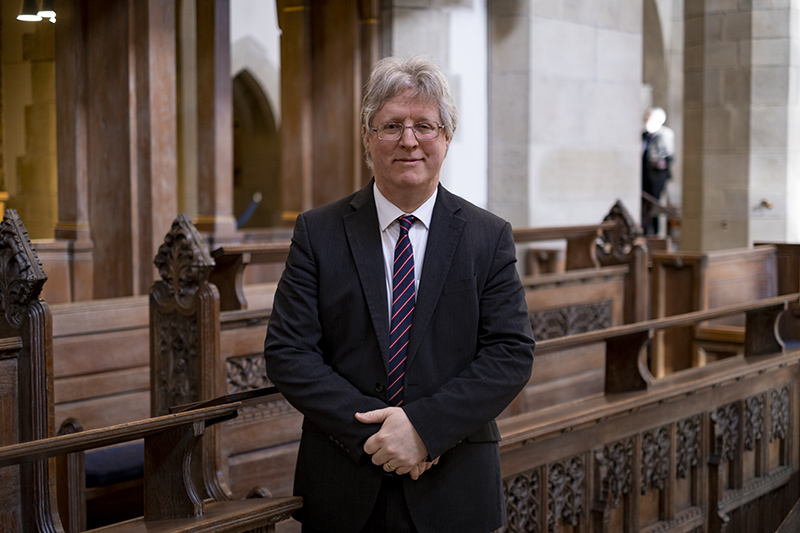On Wednesday 18th January 2023 we welcome Andrew Reid from Cullercoats to the Cathedral for our next organ recital of 2023. In this edition of ‘Notes from an Organist’ we discover more about his musical background, his thoughts on tonal colour and how it marks the continuing Christmas period.
Could you introduce yourself, how you got into music / become an organist and your musical journey to where you are today?
I’m Andrew Reid, a musician originally from Kent and currently living in County Durham. It is my great pleasure to play the tonally unaltered 1885 TC Lewis organ in St George’s Church, Cullercoats in North Tyneside each Sunday. I’m also presently assisting Daniel Cook and Joseph Beech at Durham Cathedral, and enjoying the organ and working with the choirs and colleagues there.
My career journey is rather convoluted, but has involved periods in Northampton, Cambridge, London, Liverpool and Peterborough prior to the North East. I was a cathedral musician for 17 years prior to running the RSCM and then Harrison & Harrison Organ Builders. I originally got into music as a chorister at a village church, and had the transformative opportunity to learn the organ from the age of nine and a half. I’ve also included a more traditional biography within the programme.
What can people expect from your recital at Bradford Cathedral?
The recital is loosely based around the extended Christmas period from Advent to Candlemas, and tries to include a variety of music in quite different styles, while diving around the idiosyncrasies of the Bradford Cathedral organ. There’s a quasi French Toccata, an orchestral transcription, pieces based on chorales and chant in the English, French and Germanic traditions, and a movement from La Nativité du Seigneur by Olivier Messiaen. It’s the seasonal references that hold it all together, I hope!
Why do you enjoy playing the organ?
I’ve always been an organist first and foremost, not a pianist, because of starting organ lessons so young when my piano studies were not very advanced, so the organ is a natural means of musical expression to me. I love tonal colour, and the way that it can bring music alive. It’s akin to orchestrating music every time you play. Because every organ is different there is a constant challenge finding ways to express the music according to the instrument laid out before you.
Tonal colour is one of the many ways available to organists to play expressively, and can be combined with an understanding of the architecture of phrase structure, rubato, texture, articulation, tempo, particular musical points of reference (e.g. dance) and so on. Thus there is always a creative counterpoint going on in the organist’s mind, as with a conductor in front of an orchestra. Different parameters take centre stage according to the repertoire: as a conductor doesn’t like to be a one-trick pony, nor does an organist!
Do you have a particular favourite piece out of those you are playing?
Probably the Messiaen. It is fairly obviously his response to the Liebestod of Wagner’s Tristan und Isolde: a gradual crescendo of dynamic, tessitura and tempo breaks out into the threefold climactic low E (D sharp) pedal notes under rich chords which in both pieces form a kind of plagal cadence Amen. There is then a necessary wind down of all that hyperactivity by way of coda. I think Messiaen transposes the love-death idea into a Christian incarnational context: the real thing – the greatest and most selfless love-death of all. I would also like to put in a note about the de Grigny. The final movement of this alternatim hymn setting is based on two pedal points, outlining another Amen. It’s amazing what can be done with a pedal point, just as in the Messiaen: yet these pieces are nearly 250 years apart.
This recital season we are celebrating music written by female composers. Which piece(s) have you selected, and why did you choose it / them?
I’m playing Judith Bingham’s The dawn of redeeming grace. I enjoyed meeting Judith and getting to know some of her choral pieces in London 20 years ago, but I’ve not prepared an organ piece by her before. That it is based around a well-known Christmas carol should provide a useful reference point when listening. It also conveys something of the mystery of the holy night.
Finally, how would you sum up your upcoming recital at Bradford Cathedral?
A celebration of the period of the year when the Church focuses on the Incarnation. Nothing individually is too long, so if there’s anything you don’t like, there will shortly be another piece following on! But hopefully the variety itself will be invigorating.
You can join us on Wednesday 18th January at 1pm for Andrew Reid’s organ recital, with an optional £4 buffet lunch beforehand at 12:30pm.
You can discover more about our organ recital season on our dedicated page.


(Please pass on to Andrew Reid!)
Dear Andrew – I have only just come across this entry on my computer – you will be glad to know that at my church, St Alban’s on Highgate in Birmingham, the choir will be singing your setting of the psalms in A Minor at our Choral Evensong on this coming Sunday, 27 October, 2024 – the Eve of the Glorious Feast Day of St Simon and St Jude – and that on All Saints’ Day, at our 7.30 pm High Mass the choir will be singing Wood’s ‘O Thou, the Central Orb’ – I have already passed on to my friend organising all this your updated version of the title which I remember vividly from Catz days – “Hey you, the middle ball”!!!
I think we last met in Heidelberg when you came to sing in the church of my friend, Michael Plathow – a Professor of the University – with v. best wishes, Andrew Lenox-Conyngham
Thank you for your comment – we’ve passed that onto Andrew.